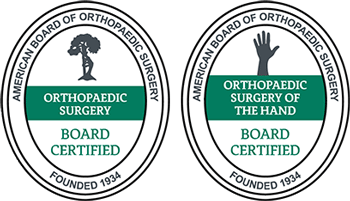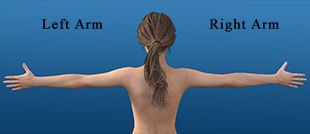The Importance of Aftercare for Hand Surgery
Hand surgery describes any surgical procedure performed on the hand that aims to improve its function, relieve pain, or both. This term includes joint replacements, tendon and nerve repairs, bone realignments, surgical drainage of cysts, and more. Hand surgery is usually a last resort after more conservative treatments, but surgery alone isn’t a silver bullet for hand issues. Aftercare is a vital piece of the surgery puzzle and essential for your surgery’s success. In this article, we explain the importance of aftercare and what to expect during this process.
Contents
Why Aftercare Matters

Aftercare helps you recover from your surgery and get the best results from the procedure. Following the aftercare instructions:
- Promotes healing to help you gain full movement of your hand sooner.
- Helps you manage and reduce your pain level immediately after surgery and in the future.
- Reduces your risk of postoperative complications, such as reinjury or incomplete healing, infections, feelings of numbness, or reduced motion.
Expected Recovery Time
Recovery time varies from patient to patient. It may depend on such factors as the type of procedure, the severity of your condition, your age, and your health, as well as if you’ve followed the aftercare instructions. Your surgeon should give you a reasonable estimate before your procedure so you can plan and prepare for this process.
Generally speaking, most people who’ve had hand surgery feel ready to return to work and normal home duties after two to four months. It can take several more months, perhaps more than a year, before you feel entirely recovered and have your full range of motion. However, this shouldn’t prevent you from participating in normal activities.
What To Expect When You’re Healing
Your body will go through changes as it recovers and heals after surgery. Understanding these changes can help you know what’s normal and what needs attention. While surgery is helpful, your body doesn’t understand this. It treats your incision site like any injury, sending fluid to the area containing cells that promote healing and prevent infection. All this fluid naturally causes swelling. While you can reduce the amount of swelling by following your aftercare instructions, some degree of swelling is normal. As with other injuries, bruising is also common but should fade in time.
Your hand may feel numb for up to 24 hours until the anesthetic wears off. Afterward, you may feel some pain, often like a burning sensation or a tingling feeling in your hand. The more complex your surgery, the more pain you may experience. Painkillers can help you manage postoperative pain. Your surgeon will advise you on the appropriate painkillers for your needs. They might suggest over-the-counter options for minor surgery or prescribe stronger painkillers after more complex procedures.
How To Care For Your Hand After Surgery
Your surgeon and rehabilitation team will tell you how to care for your hand after your surgery. Instructions may vary depending on such factors as your procedure and age, so it’s vital to listen to your health team carefully and follow their advice. Common ways to care for your hand after surgery include:
- Elevating your hand and arm as much as possible for three to seven days after your surgery to reduce swelling. A sling or special pillow may help.
- Reducing stress to promote healing.
- Taking painkillers, anti-inflammatories, and antibiotics as directed to manage your pain and swelling and reduce the risk of infection. Eating food before taking painkillers may reduce your risk of nausea.
- Keeping items you need close by to promote rest and recovery. You may like to rearrange your furniture before your surgery to make objects more accessible.
- Avoiding smoking and alcohol, both of which can slow healing and weaken your immune system.
- Drinking plenty of water to flush anesthetic and medications through your system and reduce your pain.
- Limiting use of your hand, especially immediately after surgery.
- Avoiding driving for several weeks, so make sure you arrange a lift home after your surgery.
- Avoiding lifting heavy items for the months after surgery. Labeling commonly used items as safe or not safe can remind you which objects to avoid picking up.
- Moving the parts of the hand that weren’t operated on, such as your fingers, to strengthen muscles and keep joints, tendons, and muscles mobile.
- Wearing bandages, splints, or braces, if prescribed, to support the wrist and limit movement for as long as prescribed. You may need to wear splints or braces all the time or only at night depending on your procedure and recovery phase.
- Keeping bandages, splints, braces, and stitches dry by covering them with plastic bags while bathing and keeping hands away from the direct stream of water. Plastic bags can also keep soap away from your incision and prevent irritation.
- Asking for and accepting help to reduce your need to perform tasks. Asking someone to keep you company can also improve your mental health during recovery.
- Taking care when performing everyday tasks, including opening doors, squeezing bottles and tubes, and dressing and undressing. Getting someone to help you with these tasks is a good way to avoid injury.
- Participating in rehabilitation activities, such as massages and physical therapy, to improve your hand’s motion and strength.
- Restricting your activity as prescribed by your care team, such as transitioning back to work on light duties and avoiding playing sports.
- Protecting your hand from further damage by being careful around car doors, knives, and other potential hazards.
- Calling the emergency number your surgeon provides if you have any concerns about your condition or your aftercare plan. It’s especially important to call if your hand still feels numb more than 24 hours after your surgery or you develop unusual side effects, such as fevers, bleeding, or increased pain.
At the Hand and Wrist Institute, we understand the importance of aftercare and want to make it as easy as possible for our patients. We take the time to explain aftercare in easy-to-understand terms and encourage you to ask as many questions as you need before your surgery to clarify this process. We’re also just a phone call away should you ever need us during your recovery. Contact our Southlake office at 817-968-1221 or our Dallas team at 214-308-1958 to schedule an appointment.
Orthopedics Bandage Hand Chalk by sferrario1968 is licensed with Pixabay License

























